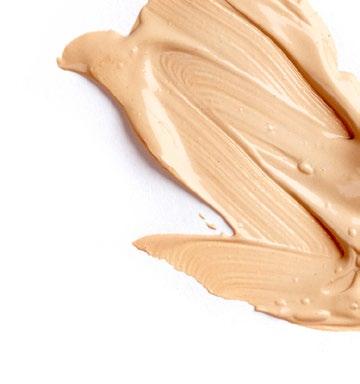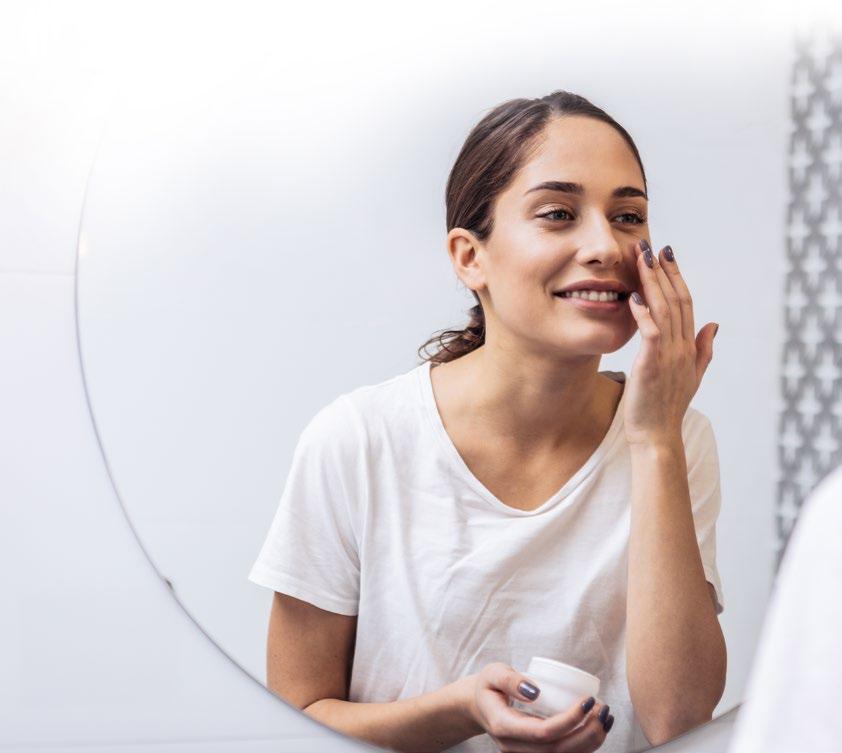
5 minute read
Skin freaking out in isolation?
WHY YOUR SKIN MIGHT BE FREAKING OUT IN ISOLATION
Most people would assume that spending all our days in isolation sans make up would result in glowing skin, right? With less makeup and exposure to environmental pollutants, it would make sense that glowing complexions are one of the more positive benefits of the COVID-19 crisis. Well, unfortunately this is not the case for everyone. Whilst some have been lucky to reap the benefits of letting their skin breathe, others not so much. From dryness, to redness, through to blemishes and patchiness, isolation skin is not what it seems. Lifestyles have changed dramatically since staying in has become the new normal. This means we’re spending far more time indoors, where the air quality is generally weaker and we’re exposed to less natural sunlight. On top of the environmental differences, changes in our habits and routine are also having a detrimental effect on our skin. Here are some of things that might be contributing to a skin freak out whilst in isolation.
Advertisement
Lack of morning routine
With morning routines out of whack, it can be easy to get up and forgo skincare altogether. Whilst you might not be wearing makeup or showering until noon, your skin still needs active ingredients to repair skin on a cellular level. However your day starts and ends, ensure that you use active ingredient serums every morning and evening. This will benefit the cells which will drink in the active ingredients that can reverse the signs of ageing, repair barrier function, hydrate and reduce inflammation.
Increase in stress and anxiety
There’s no denying that these uncertain times are bringing significant challenges to many people. Unfortunately, an increase in stress can mean an increase in skin problems too. Higher cortisol production caused by stress can cause inflammation leading to breakouts, irritation, red patches and sensitivity. Right now is a great time to go back to your stress management techniques which may involve meditation, regular movement or even limiting exposure to the news and social media. It’s important to stay informed but do so in a balanced and controlled manner that will help keep cortisol levels down (which your skin will thank you for)!
Lack of cleansing
If makeup is a thing of your pre-isolation past and you’re using less now, you’d expect your skin to be glowing, right? Well unfortunately for many this isn’t the case because makeup removal and cleansing often go hand in hand. Whether you’re wearing makeup or not, it’s still important that you cleanse your face every day. Household toxins caused by dust, cleaning products and even bedding will still sit on the skin’s surface impacting the microbiome so they must be washed away daily. Ensure that you use a gentle cleanser and microfiber pad to remove invisible toxins and surface dirt just as you normally would. Not only does this clear away any impurities from the skin, but it also opens up the pores to help serums penetrate deeper.
With working from home, a lack of routine and nowhere to go, it’s easier to reach for a drink when you wouldn’t normally. Apart from sinking into poor food choices increased alcohol consumption can lead to problematic skin. The reason being is that alcohol is a diuretic which means it dehydrates skin cells at a faster rate than regular drinks. The best way to combat this is to limit alcohol consumption whilst ensuring you keep skin cells hydrated. If you do happen to succumb to a few espresso quarintinis or prosecc-isos, give your skin a big hit of hydration the next morning to replenish lost moisture. We love Biologi’s Bf Hydration Serum which is unique blend of fruit acids and vitamin C that hydrate, soothe and repair, leaving the skin feeling smooth and supple.
Irregular sleeping patterns
A disruption in your normal 9 to 5 routine likely means that you’re going to bed later than normal or that your sleep may be disturbed. Lack of sleep leads to obvious signs such as dark circles and bags under the eyes. Furthermore, cellular turnover and hormone production can be impacted by less zzzzs. Turns out that there’s some truth in the term ‘beauty sleep’ – in fact there’s a direct correlation between the quality of your sleep and the quality of your skin. From 11pm onwards, cell mitosis accelerates. The more rested and relaxed you are during this time, the more effective the process. Try to aim to get to sleep before 11pm each night and for a minimum of seven to eight hours of uninterrupted rest. The result will be a beautifully glowing complexion and a more youthful appearance.
Not enough exercise
Yes, the gym is closed and there are no more boot camps so it makes it harder to keep up a normal exercise routine. However, exercise isn’t just good for the waistline, it’s good for the skin too! Regular exercise encourages blood flow which delivers nutrients to the surface of the skin leading to a radiant complexion. Sweating also helps purge bacteria and toxins from the skin to help maintain a healthy PH and give you back your glow! The advice here is to keep moving! Walk or run daily, set up a home gym, download an app or join an online PT class. There are lots of options to keep moving during isolation and your skin will thank you for every single one of them!
Lack of professional treatments
With many beauty salons closed, it’s likely your skin may be missing the extra TLC that regular facials and treatments can provide. However, remember that you can still show your skin some love by implementing a facial routine at home, ensuring that you continue to protect and nourish your skin cells. Just be sure not to overdo it and stick to natural products that – too many synthetic ingredients can throw skin out of whack or cause toxicity over time. Invest in some quality natural serums like Biologi’s Bd Face Luminosity Serum which is a storehouse of antioxidants that will leave skin looking refreshed, radiant and luminous.

By Lucy Macdougald, Biologi’s Dermal Specialist www.biologi.com.au




